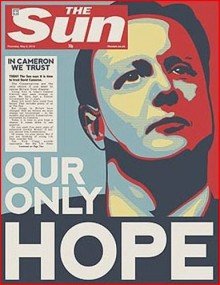In an era in which every single national newspaper is experiencing a decline in sales apart from one, the i (The Independent’s little sister) should we be too concerned about their influence and agenda? Add in to that the data that shows that the readers of The Daily Telegraph, The Mail and The Express tend to be relatively old it suggests that the upcoming readers and voters will tend to find alternatives. The internet is the future for many and as much as it will be a shame that newspapers become increasingly parochial and anachronistic it should be said that a less parochial approach to the world has to be welcomed.
But we also know that the owners of these newspapers haven’t got where they are today by putting all of their eggs in one basket. Diversification and vertical integration has meant that their influence within a state and their control of information is much broader than many are aware. Following the publication of the Leveson report many are already criticising the prime minister for giving in to media owners and editors at the expense of the ‘victims’ of the unethical behaviour ripe within the industry. It has become a bi partisan debate between those who argue that legislation is required to reinforce an independent body that will oversee the press and those who argue that any legislation is a slippery slope to a state controlled media. Both sides have merits but as usual the debate is dumbed down to attract support.
Let’s make this clear – the national and local press is not free and never has been. Not only is there already legislation that prevents absolute freedom but the ownership of each and every one of them leads to an agenda even if it is only to maximise profits. Local and national journalists are increasingly unlikely to be investigative in seeking out the dark forces that undermine societies or countries or even globally. But they are increasingly being asked to provide snappy eye catching headlines that’s sole purpose is to provide just enough information to keep the regulars satisfied. Little in substance or job satisfaction but sales at an acceptable level. Newspapers tend to pick sides whether it be matters of politics or morality. The bi polar approach tends to leave out much of the substance in between or at least it becomes peripheral.
An example of this is that the newspapers, in particular, have failed to tell us the following in relation to press regulation.
- Seventy-eight per cent of the population wants independent press regulation backed by statute.
- No witness or anybody else at the Leveson Inquiry advocated state control of the press.
- Lord Justice Leveson’s terms of reference require him to make recommendations that support press freedom.
- Editors have been seeking the power to license journalists by ensuring that only people they approve can have press cards.
- Far from being in financial difficulty, the Daily Mail, Mirror, Sun, Express and Star papers make well over £200m in profit a year.
- Twenty-six leading academics in law and journalism have written to the press to denounce the editors’ proposed new self-regulation scheme as inadequate.
- Statutory backing for a press regulator is supported by the NUJ, the largest organisation in the country representing journalists.
- It was ITV, whose regulation is underpinned by statute, and not the ‘self-regulated’ press, that opened the floodgates of revelation about Jimmy Savile.
- The overwhelming majority of victims of phone hacking and data mining are ordinary people and not celebrities.
- Only last month the Mail and Mirror were fined for contempt of court after their reporting helped cause the abandonment of a child kidnapping trial.
If the press were on our side they would give us all the facts and let us decide. This goes for every topic. But they don’t. They decide what will gain our attention or what they want us to believe and that is what they give us. WE lose and they still keep making huge profits. Our ignorance is reinforced and their influence expands. Can you imagine the bias that will become entrenched if we have a referendum on Britain’s place in Europe. If we rely on the newspapers we would have to devote all day every day identifying what is false and what is real. What a waste of time.
The press and much of the mainstream media have their own agenda and we become the unwitting standard bearers of gossip, propaganda and a little news at the expense of profundity.
I say shame. What do you say?
If you want to find out more then Hacked Off provides detailed information as does this podcast entitled Leveson: the politics of press regulation – Guardian podcast special.
Douglas James







